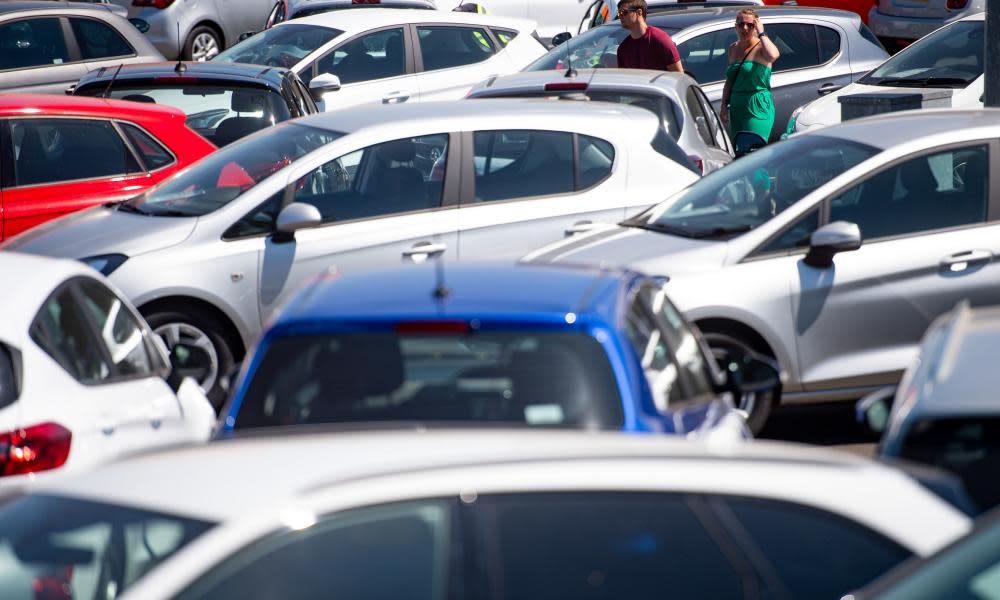UK new car sales fall to lowest level in June since 1996 amid chip shortages

Sales of new cars in the UK fell by almost a quarter last month, the worst June since 1996, as global chip shortages hammered the industry.
Global shortages of components such as semiconductors, exacerbated by Covid restrictions in China, continue to hamper manufacturers’ ability to keep up with demand, the Society of Motor Manufacturers and Traders (SMMT) said. Drivers are waiting more than 12 months to take delivery of some models.
The SMMT reported that 140,958 new cars were registered last month, 24.3% fewer than in June 2021. Large corporate fleets recorded a 27.6% drop in sales, while private consumer volumes dropped by 21.%. So far this year, 802,079 new cars have been registered, down almost 12% from this time last year – the second-weakest first-half performance in 30 years.
Related: Electric cars sold in UK passes half a million despite supply chain issues
Battery-powered electric vehicles continued to be popular, with sales up 14.6% to 22,737 in June, lifting their market share to 16.1% from 10.7% a year earlier. However, plug-in hybrid electric car sales fell by 36.5% from last June to 7,714 and their market share slipped to 5.5% from 6.5%. Hybrid electric vehicle sales fell 7.3% to 14,978 but managed to lift their market share to 10.6%.
Mike Hawes, the SMMT chief executive, said: “The semiconductor shortage is stifling the new car market even more than last year’s lockdown. Electric vehicle demand continues to be the one bright spot, as more electric cars than ever take to the road, but while this growth is welcome, it is not yet enough to offset weak overall volumes, which has huge implications for fleet renewal and our ability to meet overall carbon reduction targets.
“With motorists facing rising fuel costs, however, the switch to an electric car makes ever more sense and the industry is working hard to improve supply and prioritise deliveries of these new technologies given the savings they can afford drivers.”
The government recently scrapped the plug-in car grant, which means the UK is the only big European market without purchase incentives for private EV buyers, the trade group said.
Alan Banks, the chief executive of the industry group TechWorks, told MPs on the business, energy and industrial strategy select sommittee that the global semiconductor shortage was likely to continue through 2023.
He said carmakers had been hit harder than other business sectors because the semiconductors used in cars were more specialised, as they needed to be able to endure extreme temperatures.
Jim Holder, the editorial director of the magazine and website What Car?, said car buyers were affected by a number of problems. New car orders were delayed, while rising energy bills were pushing up manufacturing costs, which was increasing prices for consumers. “The result is longer waiting times on cars which will cost more to buy,” he said.
In a sign that the situation may be improving, UK car production in May grew for the first time since June 2021, up 13.3%, with 62,284 units leaving factory gates, separate SMMT figures showed last week.
Ben Nelmes, co-founder of the green motoring consultancy New AutoMotive, said rising petrol and diesel prices were driving consumers towards electric cars but the supply of vehicles could not keep pace with demand.
“We hear that delivery times for electric cars are now between 40 weeks and a year,” he added. “The supply of electric vehicles is the biggest barrier to cleaner road transport in the UK.”
The government is planning to adopt a zero emission vehicle mandate, which will require manufacturers to sell a certain percentage of those cars and vans from 2024. Nelmes urged ministers to ensure the level is stronger than the proposed 22%.
The government has pledged to reach net zero for carbon emissions by 2050. To help achieve this, sales of new petrol and diesel cars and vans will be banned from 2030.

 Yahoo Movies
Yahoo Movies 
